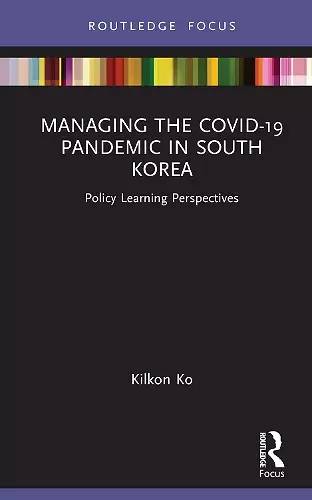Managing the COVID-19 Pandemic in South Korea
Policy Learning Perspectives
Format:Hardback
Publisher:Taylor & Francis Ltd
Published:5th Jun '23
Currently unavailable, and unfortunately no date known when it will be back

This book examines the importance of accumulated disaster management experience and the risk awareness of civil society by analyzing Korea’s COVID-19 response from the perspective of policy learning. Prior to the spread of COVID-19, Korea was a country with active exchange with China, with over six million Chinese visitors and over five million Korean visitors to China. Korea also has the highest population density among OECD countries and an urbanization rate exceeding 90%, making it vulnerable to the spread of infectious diseases. However, Korea had very low fatality and infection rates among OECD countries, despite foregoing border closures or city lockdowns.
Korea is known as a representative example of state-led economic development called the developmental state model. However, Korea’s COVID-19 response emphasizes citizen-led efforts, the use of information and communication technology, and successful disease control through cooperation between the government and civil society. This book presents examples that demonstrate the effectiveness of disaster response based on democratic values, by enhancing the capacity of civil society through social interaction resulting from various models such as rational models, heuristics, cooperative governance, policy networks, and complex adaptive systems. Additionally, it argues that the lesson learned from Korea’s COVID-19 experience is not that a strong state should control citizens’ freedom to increase the effectiveness of disease control, but rather that sharing the awareness of the risk enables voluntary citizen responses and solidarity consciousness of civil society is essential.
The book is a useful reference for anyone interested in learning more about the value of actors in policy networks.
"In his book, Managing the COVID-19 Pandemic in South Korea: Policy Learning Perspectives, Kilkon Ko provides a thoughtful, well-documented analysis of how South Korea, as a democratic country, managed the COVID-19 pandemic using a flexible, informed strategy that relied largely on voluntary cooperation with an informed civil society instead of mandatory, hierarchical controls. This is a powerful analysis that presents insights gained from South Korea’s responsible management of this global threat that will inform other nations in other global threats that will surely come."
Louise K. Comfort, Professor Emerita and former Director of the Center for Disaster Management, Graduate School of Public and International Affairs at the University of Pittsburgh, PA, USA
"In the field of disaster management, the current COVID-19 pandemic has now become a central research theme covering its origins, causes, and remedial strategies. This book systematically covers the widely discussed control mechanisms (e.g., border control, social distancing, and lockdown), explains relevant theoretical approaches, highlights the use of government-citizen interaction and civil society in South Korea, and emphasizes the retention of pandemic-management lessons for facing similar future challenges. This is a very useful book to offer empirically supported arguments and research guidelines for academics and policy makers."
M. Shamsul Haque, National University of Singapore, Singapore
"The book uses several perspectives, theories, and frameworks from emergency and crisis management in examining Korea’s successful response to COVID-19. Several frameworks were utilized because of the complexity of the COVID-19 response by the government as well as partnership with other stakeholders and members of society. The book highlights collaborative governance, transparent risk communication, and effective lessons learned from MERS experience as core success factors in response. The book is an important resource for scholars, practitioners, and policymakers."
Naim Kapucu, School of Public Administration & School of Politics, Security, and International Affairs, University of Central Florida (UCF), USA
ISBN: 9780367645373
Dimensions: unknown
Weight: 453g
124 pages